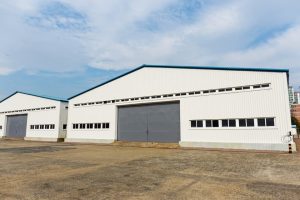Are you ready to get the new roof installed? No more leaks, energy savings, and happy employees! Cost is probably a significant factor in your new roof project. But never fear, you have plenty of options to help pay for your building improvements.
At West Roofing Systems, we work will businesses, non-profits and municipal groups of all sizes. We recognize that you may not have all of the funds available to make recommended upgrades to your facility.
In this article, we cover a few ways you can pay for your new commercial roof.
Section 179

As of Jan. 1, 2018, the Tax Cuts and Jobs Act has expanded the definition of qualified property that is eligible for expensing under Section 179 Tax Deduction; this includes improvements to commercial roofing.
Read More: Section 179 Tax Deduction for Commercial Buildings
Under the Tax Cuts and Jobs Act, the amount of money that taxpayers are allowed to deduct has increased to $1 million on their income taxes as an expense, rather than requiring the cost of the property to be capitalized and depreciated.
It may seem daunting when you start looking into tax law, but Section 179 is not as complicated as it may seem. Section 179 of the IRS Tax Code allows a business to deduct, for the current tax year, the full purchase price of equipment and off-the-shelf software that qualifies for the deduction.
Try It: Section 179 Calculator
Simply put, the US government wants businesses to invest in themselves, so if you purchase something for your business that qualifies, you can deduct the full price of that business purchase on your taxes of that same calendar year.
Cooperative Purchasing

Government, educational and non-profit agencies are often required to obtain goods and services through a procurement process to ensure that the funds are used wisely. This procurement process involves collecting bids from contractors to find a contractor at the lowest price.
Read More: How to Easily Meet Your Bid Requirements Through Cooperative Purchasing
Every state has “joint powers” or cooperative purchasing laws that allow one agency to use the work done by another. Cooperative purchasing organizations create a network of members and vendors to leverage contractor bids from all over the country to fulfill your agency bid requirement while virtually eliminating the administrative work needed from your team.
More Information: West Roofing Systems and Sourcewell Coop Purchasing
When an agency is required to go through a bid process to secure a vendor for their project, there may be an emphasis on choosing the low-bid contractor which runs the risk of a low-
quality contractor. Cooperative purchasing allows agencies the flexibility to select the contractor that best fits their needs, from price to quality and contractor qualifications.
Grants
 It’s common for the government to award funds for capital improvement projects. There are many organizations that can benefit from a grant for their capital improvements: nonprofits, municipalities, small businesses, businesses investing in eco-friendly or energy saving practices… to name a few.
It’s common for the government to award funds for capital improvement projects. There are many organizations that can benefit from a grant for their capital improvements: nonprofits, municipalities, small businesses, businesses investing in eco-friendly or energy saving practices… to name a few.
Common types of grants include:
- Block Grants – community development or social services
- Government Grants – federal grants to promote sustainable communities
- Energy Incentives – to encourage the implementation of energy saving practices
To receive a grant from either the government or a private party, you will have to match a set of criteria and apply. Roofing project proposals usually can be included to help make your case, but keep in mind that you are competing against other organizations that are applying for the same grant.
Financing

Many businesses use financing to pay for their capital improvements. You can get a loan from a bank or other type of lending institution, but first, you should weigh your pros and cons. You will have to go through the loan application process, and you may have to pay a down payment and/or provide collateral. You will also have to pay interest on top of the project price.
There is an upside to financing your roof, the interest from your payments are considered a business expense, and you can deduct the interest total from your taxable income.
Read More: Options and Impacts of Capital Improvement Financing And Planning
West Roofing Systems Business Partnerships
At West Roofing Systems, we have built business partnerships in our community. We are partnered with a trusted bank to help bring affordable financing to help our customers.
These types of partnerships can be win-win-win for all parties involved:
- The customer can get approved for financing – sometimes with a bit of a discount
- The bank can provide financing to a trusted company
- The contractor sells the project and can get started quickly
Terms

While it may be uncommon, you can ask your contractor to pay for your project in installments, or on terms. This usually comes with a payment due on the project completion, and the balance is to be paid off in a specific time frame. This type of payment plan will come with interest, so the longer you take to pay off your bill means the more you pay.
This option would be ideal for companies or groups that run on limited cash flow. Your contractor will want to do their due diligence before accepting payments on terms; they will pull a D&B Report and most often, you need to have a stable relationship with your contractor.
As you can see, there are many options to pay for your new commercial roof installation or repairs. Don’t settle for a leaky roof again!
Here at West Roofing Systems, we’ve installed over 57,700,000 sq. feet of roofing domestically and internationally. are dedicated to not selling you a new roof but working with you on a solution for your roofing problem.
If you have any further questions about what your commercial roofing system will cost or how to start a project, email us anytime at info@westroofingsystems.comor by filling out our form online to find out more.
Read More:
- How Much Will a Commercial Roof Cost?
- My Contractor Ripped Me Off: What Do I Do?
- How to Compare Commercial Roofing Quotes
Article Here: How to Pay for Your New Commercial Roof

No comments:
Post a Comment